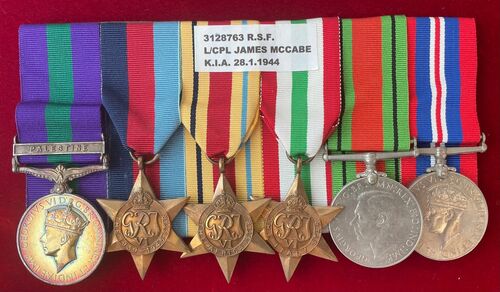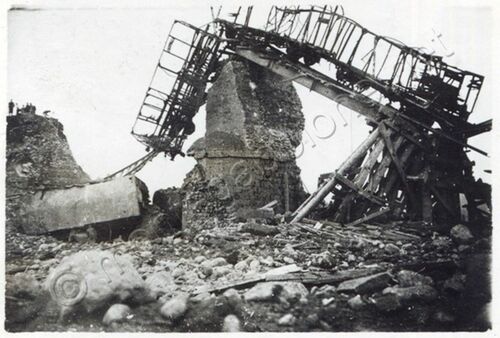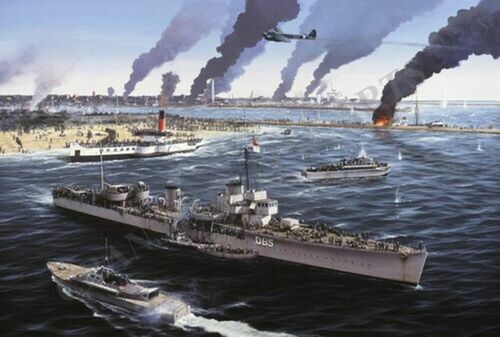Auction: 23112 - Orders, Decorations and Medals - e-Auction
Lot: 591
The tragic campaign group of six awarded to Lance-Corporal J. McCabe, 'A' Company, 2nd Battalion, Royal Scots Fusiliers
McCabe survived the gallant - if desperate - rear-guard action in 1940 when his Battalion held the Ypres-Comines railway line, then the Canal and finally a farmstead before a thier last stand
Evacuated at Dunkirk, McCabe was to be wounded in July 1943, before being taken a Prisoner of War in January 1944; he would be killed just days later when the United States Air Force bombed a bridge at Allerona, Italy, over which the train crammed with Prisoners of War, McCabe included, was passing
General Service 1918-62, 1 clasp, Palestine (3128763 L/Cpl. J. McCabe. R.S.F.); 1939-45 Star; Africa Star; Africa Star; Italy Star; Defence and War Medals 1939-45, contact marks to this first, otherwise good very fine (6)
James McCabe was born in 1915 at Knockinlaw, Kilmarnock, Ayrshire.
The 2nd Battalion, Royal Scots Fusiliers were serving in Edinburgh at the outbreak of the Second World War. In early October 1939 the Battalion was grouped with the 2nd Battalion, Seaforth Highlanders and 2nd Battalion, Northamptonshire Regiment to create the 17th Infantry Brigade, which was assigned to the 5th Infantry Division. They were sent as an independent brigade group to France in late 1939 to join the rest of the British Expeditionary Force and were involved in the Battle of Dunkirk before being evacuated to England.
Between 26-28 May 1940, along a stretch of the Ypres-Comines Canal, the 2nd Battalion of the Royal Scots Fusiliers fought a desperate rear guard action so that the British Expeditionary Force could carry out their evacuation at Dunkirk. As part of the 17th Infantry Brigade, along with the 6th Battalion, Seaforth Highlanders and the 2nd Battalion, Northamptonshire Regiment, they were required to hold the Ypres-Comines railway line, then the canal and finally a farmstead before a last stand that saw their CO declare that they '...would not go a foot back.'
A superb account of the Battalion's rear-guard action which can be found via:
https://www.royalscotsfusiliers1940.com/the-battle
After 2 years spent on home defence in the United Kingdom, the Battalion and Brigade were detached from the 5th Division, and like the 1st Battalion, fought in Madagascar. The Battalion next saw service in Sicily.
McCabe was reported as wounded in action on 12 July 1943 and later as a prisoner of the Germans on 17 January 1944. Initially imprisoned at Stalag IX C, McCabe and other prisoners were being transported to Germany by train being evacuated in anticipation of the Allied advance. At the Orvieto North railway bridge at Allerona the US 320th Bombardment group destroyed the bridge completely unaware that the train was full of Allied Prisoners of War.
Richard Morris of the US Army who was on the train recounted in his memoirs:
'...the train was halted on the bridge over the river when the Allied bombs started to fall, and the German guards fled the train leaving the prisoners locked inside.'
Iris Origo wrote in her diary, War in Val d'Orcia that '...some of the carriages plunged into the river: there were over 400 dead and wounded.' Captain William Cook, the Intelligence Officer of the 320th Bombardment Group wrote afterwards that '...an excellent concentration of bombs bracketed the bridge...a train of 40/50 cars standing across the bridge received direct hits destroying 10 cars, derailing three and the remainder buckled up in an arch.'
So it was this '...was possibly the worst incident of 'friendly fire' in the second world war, and certainly the worst in Italy' according to Janet Kinrade Dethick, a British expatriate living in Umbria, who has carried out extensive research into the tragedy. Her dedicated website gives more detail:
https://bombedpowtrain.weebly.com/
McCabe is commemorated on the Cassino Memorial.
Subject to 20% VAT on Buyer’s Premium. For more information please view Terms and Conditions for Buyers.
Sold for
£240
Starting price
£170









